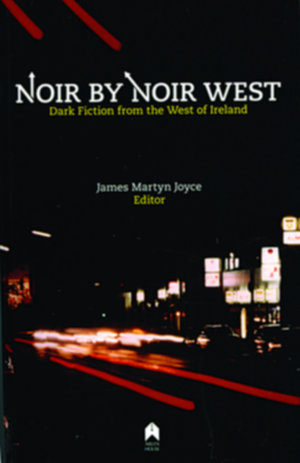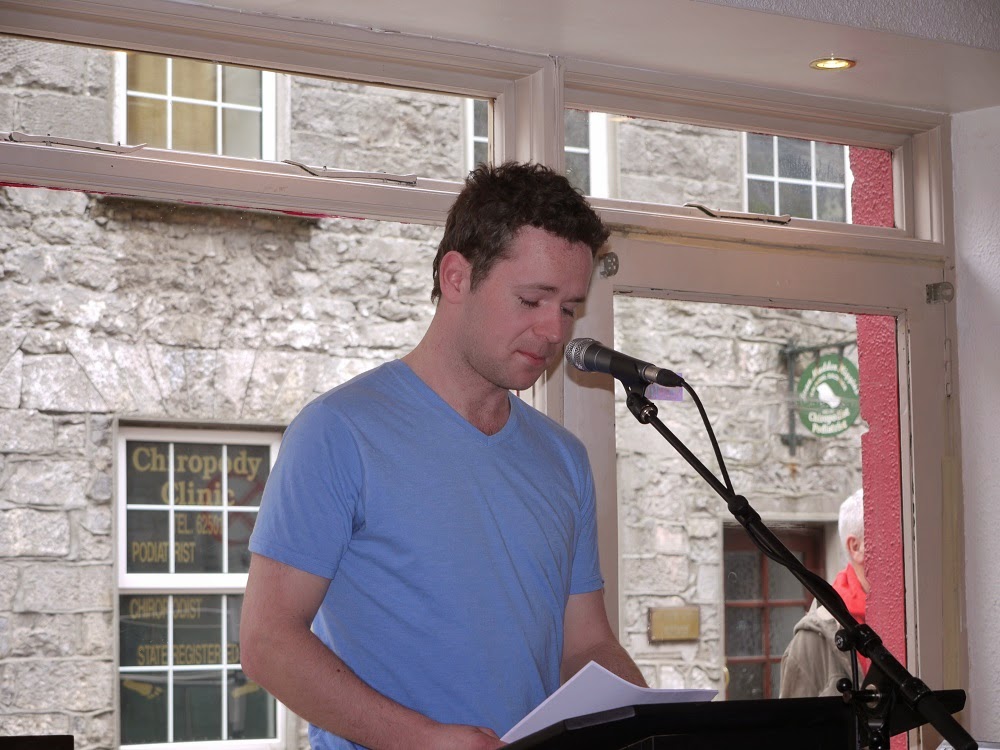Noir By Noir West - disquieting Galway stories
GALWAY ADVERTISER, APRIL 24, 2014.

How about this for revenge? A man dumps his wife for a younger model. Wife appears quite civilised about it. But just as ex is about to go off on a classy holiday with new model she asks him to check out an old property she is thinking of buying. It’s in an awful state, but she needs him to trip a switch on the meter box in the tiny space under the stairs so she could check the lights on each floor. It will only take him a minute. Its a small space, and she is wearing a tight skirt and hates spiders.
It is the least he could do. He leaves the new model waiting at the airport. He’ll only be a few minutes. But once inside the ‘tiny space’ she slams the door closed, reinforcing it shut. He is trapped ‘ hunkered there, on his knees like a penitent, shouting...’ Hours later he feels water coming in slowly. His clothes are soaked. And then he remembers what she had said: “ Flood plain. The blocked drain outside the door, swollen river, and rain promised for days to come...”
Or the man who loves pike, those fierce looking fish ‘who devours 200 times its size in a lifetime.’ He hates the tourists who come to kill them.‘ I live on the boat Easter to October. Moonlight is the best time on the Corrib. I like to glide in the shadows, pike nuzzling up to the boat. They know me. Beautiful creatures. But tourists come and kill them.
‘There was a fella last year, big German with a belly. Fell off the jetty. I could see the cut above his eye. Kept shouting and clawing at the side of my boat, gasping, trying to say something. Couldn’t make out what. Don’t speak German...’
Or the terrible confrontation between a father and son in Crowes pub on Sea Road. The Kray twins aren’t in it for viciousness! The father, who was sitting at a table with an ice bucket in front of him. He was called Baby Face by Galway girls when he was a teenager. Galway boys knew not to say it. They were the savage Kings of Galway who dealt in all kinds of ‘merchandise’.
Except for the father, the pub was deserted. ‘The Galway Novena was on in the Abbey church.’ The son enters. His three minders follow, and stand to one side. A fierce argument erupts between the father and son. It is evident that the son, at some stage, is going to wipe out the father, but in a dramatic movement the father beats him to it. He suddenly produces a gun from under the table, aims it at the three bodyguards, warning them to freeze. At the same moment he brings a blade down on his son’s left hand and cuts it off. ‘The son screams. He tries to struggle. Blood spurts onto the table. The father grabs the other arm, and cuts off the right hand....He drops both hands into the ice bucket. And arranges them so they point upwards as if in prayer.’
After all, the Novena is on at the Abbey...
Widespread popularity
These stories, written by Geraldine Mills, Gerry Galvin and Séamus Scanlan respectively, are just three of 31 collected by James M Joyce, and gleefully published in a macabre and very entertaining collection Noir By Noir West - Dark Fiction from the West of Ireland, which was launched at the recent Cúirt festival.*
I am not quite sure why many of us enjoy noir or dark fiction/movies or those Scandinavian detective series. There is a difference between ‘horror, and ‘noir’. Monsters and other elements of horror have appeared in storytelling since prehistory, such as Beowulf and The Odyssey. In the 19th century Mary Shelley, Bram Stoker, and Henry James incorporated monsters, vampires and ghosts into their stories, which enjoyed widespread popularity. But noir, or dark fiction, is more subtle, I think, exploring the darker side of human nature without the recourse to total fantasy, such as monsters. The Grimm brothers have been disturbing our children since they first published their German folk tales in 1812. And generations of children love them.
A disturbing story
One of the objectives of this collection is to encourage new talent. Kernan Andrews, in his Im Niemandsland, presents an original twist on World War I. A Jewish soldier, Hans Rubenstein, is fighting in France for Germany. He receives a letter from his brother Emil who is serving the Kaiser in western Russia. Emil is amazed to discover ‘the numerous villages , and even some towns, where the inhabitants are almost entirely Jewish. I hear snatches of Hebrew amidst the Russian and Yiddish.’
He writes that he is ‘ immensely proud to be both Jewish and a German soldier, playing a role, however small, in alleviating the suffering of Russian Jews, one Ashkenazic aiding another.’
The irony is of course that barely 24 years later the Germans came back to round up all those Jews. Millions were murdered. At Babi Yar, a ravine in Kiev, Ukraine, on September 29/30 1941, at least 35,000 men, women, and children were shot in one action.
An equally disturbing story, by Cristina Galvin, is set in a world without beauty; only ‘ boarded up pubs, the once-upon-a-time grocery store with produce still moulding on rusting shelves - hairy orange, wizened turnip, tomatoes gone a-mush with maggots.’ In the streets ‘the smell of fetid matter assaults you and you clasp your belly and heave...’
But into this decaying world, a mysterious blue flamingo comes and nests in a young women’s garden. The woman watches the bird ‘all tension dissolving’ her eyes lit up lantern -like...her heart opens.’
The woman is inspired to act. Putting on her warm clothes she takes to the streets, and the reader follows her, camera-like, as she passes through the rotting city until she comes to a queue of women with small children and babies. They are waiting outside a concrete barracks.
Apparently there is a surfeit of children in the country. The mothers are handing in their babies. We do not know what happens to them, but the women leave ‘buggy-less and weary-looking, and make their way back towards the estate’.
The woman the reader is following manages to enter the barracks, and emerges with a baby hidden under her coat. But she is disturbed by a man running up the street. Frightened she runs down an alley and hides the baby in a wheeliebin.... In a beautiful piece of writing Cristina cleverly allows the reader to enter the story and to take the baby into its care, while ‘with feathers shimmering against the sky’s indomitable grey, the blue flamingo sits.’
NOTES: * Noir by Noir West (has a suitable Alfred Hitchcockian ring about its title), is published by Arlen House, and is on sale in all local bookshops at €17. Dagmar Drabent’s cover design is perfect.
It is dedicated to the late Gerry Galvin, and follows two previous collections: Galway Stories, edited by Lisa Frank( €13), and What’s Not Said, edited by James M Joyce (€13).




